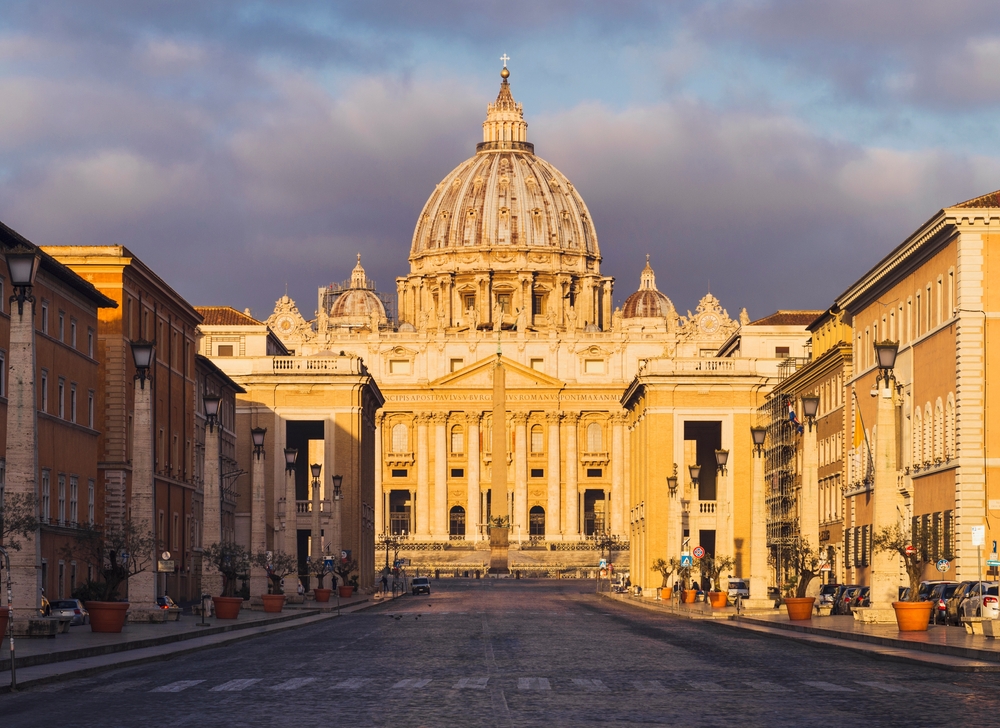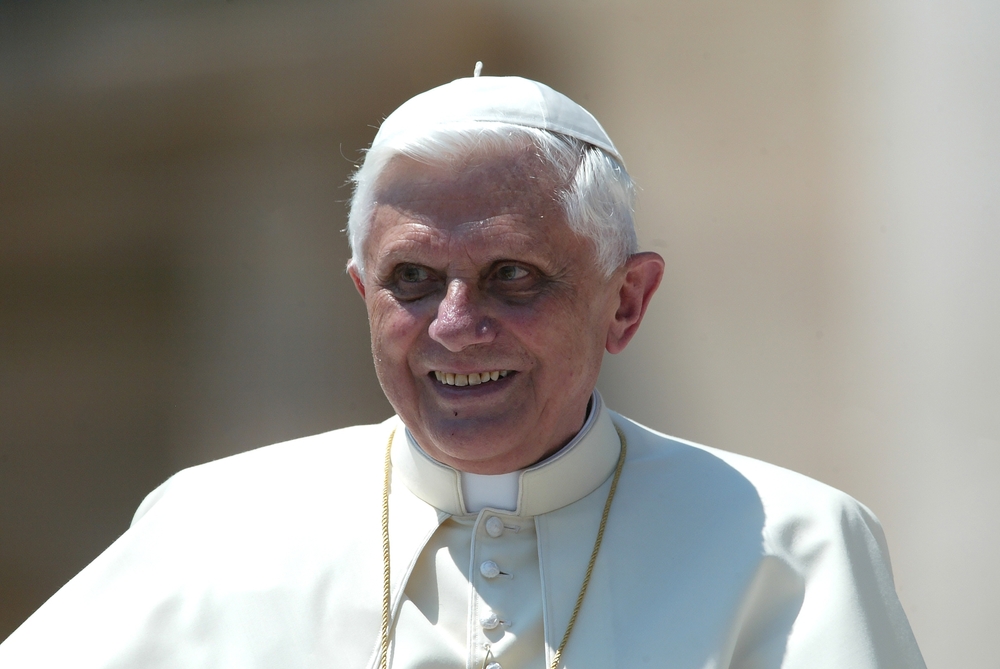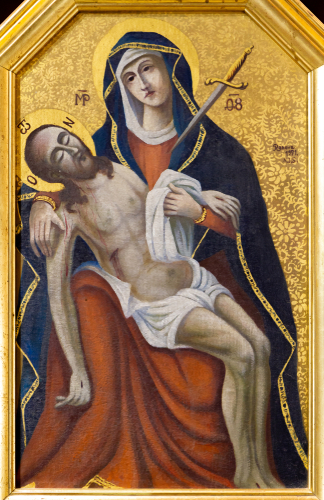
Blog Master’s Note: The following is the first in what I hope will be a series of guest blogs. Today’s post is by Teresa Messineo. Her biographical information is at the end of the post. This post is her wonderful commentary on my post last week on the Constantinian “heathenism” (paganism) of the Church. I think it is excellent. I hope you all do as well. The picture I chose for the top of the post is of a book by my journalist friend Christopher Altieri which is a collection of his reporting on the crisis in the Church. I include it here because if anyone is moved by Teresa’s post to learn more of the crisis in the Church this is a great place to start.
So many essays are penned today about Church reform and so many of them are angry. And I get it. I was raised in an angry church.
As a kid, I attended outdoor mass where armed guards walked the perimeter, their German Shepherds tugging at their leads. I knelt down to receive communion in rented ballrooms, in Holiday Inns, in picnic pavilions where pistols were sold out of car trunks for cash after the closing hymn. For years, my parents ran bootleg Latin masses out of our basement boiler room, the furnace kicking in at inopportune times, drowning out the elderly priest as he shakily proclaimed the Word of God.
I do not judge my parents’ generation, or the form of civil disobedience their faith life took. People were – and continue to be – betrayed by those in positions of power within the church. While their bishops lived like modern day royalty – a sort of flabby, old white man jet set – hardworking families went without braces for their kids and much-needed car repairs in order to keep their parishes open, only to have their school and church doors locked anyway, their donations greedily pocketed. For those schools that remained open (like my own high school), children were raped by trusted priests and then gaslighted to keep silent, with devastating and far-reaching effect (see my essays on this here and here). In the post-conciliar church, sanctuaries were ransacked; statues of Mary and baby Jesus ended up on the curb; my dad once saved a whole monastic library that was piled up outside in the grass, waiting to be burned (I don’t know that we actually read many of these books, but it was the principle of the thing). For those who enjoy reading childhood accounts like mine, as a kind of nostalgic Catholic-Americana, perhaps no one does it better than Veronica Chater in her full-length memoir, Waiting for the Apocalypse (I also link an early piece I did on this, for the New Oxford Review).
But neither anger nor nostalgia for an earlier time will help us now. If we are serious about church reform – and not just intent on venting our rage – we will have to try something else. Dr. Larry Chapp, in his essay, The Constantinian Heathenism of the Church: Ratzinger and the Crisis of our Time, makes the argument that the church’s ‘hyper-magisterialism, born out of an idolatrous ecclesial ideology that makes the Church an end onto itself rather than a mere medium to Christ’ is coming dangerously close to the mark here. While my formative years left me very well catechized (I have won money naming the Six Precepts of the Church), it was not there that I learned of the Nature and Person of Christ. I learned doctrine. But, at best, that is a beginning, not an end. ‘And unto whomsoever much is given, of him much shall be required’ (Luke 12:48), and much, much more is required of us. Following Christ demands morality, but morality is far more than error-avoidance. As Chapp aptly puts it, ‘The proper uses of the magisterium devolved into a hyper-magisterialism that turned the doctrine of apostolic succession into a weaponized ideology of control. Theological orthodoxy and holding to all the right doctrines became a central focus of the Church’s concept of salvation as such, elevating doctrines and creeds beyond their status as second and third level reflections on the sources of Revelation, and into the realm of Revelation as such.’ I could not have said this better. I have seen grown men cry, not out of repentance, but out of sheer terror, paralyzed into inaction (when action was morally necessary) by their fear of sinning, of breaking a rule, of making a mistake.
So what can we do? Pick up any Catholic publication, and the list of quick-fixes for our church seems endless. Outlaw the Norvus Ordo. Get rid of altar girls. Say this novena (it will make the devil really, really mad). Put Benedict back on the Chair. Ban all Praise and Worship hymnals (okay, that last one is tempting). But is there a secret recipe for getting our church ‘right’ or, at least, setting her on a better course? I don’t believe in quick fixes. But if there is anything useful I have learned from my unusual vantage point in the church, I offer it now.
1) Either you love Jesus Christ, or you don’t. There are a lot of other points I could make, and a lot of other arguments we could have, but all of them are pointless without this. I think a lot of people – and a lot of people that were and continue to be in positions of power in the church – have fallen out of love with Christ, if they ever cared for Him at all. You can wring your hands in despair over this; or you can start piling up kindling around the nearest stake; but I feel the purpose of church reform would be better served by everyone concerned being honest about this. Personally, for me, living without Christ – without a consuming love for Him – would truly be terrible, but it’s not that way for everyone. If your parish priest, or local bishop, or that nun I had in high school who used to smack every male student within range with her spiral-bound notebook no longer cares for Christ, that needs to be admitted as the first step towards their stepping down from places of authority, and our church beginning to heal. Even if they are outwardly invested in the trappings of the church – in their high-end real estate, in felt banners, in scarves and mittens that match the colors of the different liturgical seasons – without Christ, it was all a façade, anyway, a shambles that could never stand. You might argue they are making the wrong decision, giving up Christ, and I would agree with you. But I have a feeling they gave up on Him a long time ago. Let these church leaders – who cannot lead us because they do not like the Head of the Church, let alone love Him – remove themselves from the mix. And, after that, let’s see what we have left to work with. Chapp quotes Ratzinger’s prophetic 1958 lecture, The New Pagans and the Church: ‘And so it seems certain to me that the Church is facing very hard times. The real crisis has scarcely begun. We will have to count on terrific upheavals. But I am equally certain about what will remain at the end: not the Church of the political cult … but the Church of faith. It may well no longer be the dominant social power to the extent that it was until recently; but it will enjoy a fresh blossoming, and be seen as man’s home where he will find life and hope beyond death.’
2) Neither the Left nor the Right will save you. Anyone naive enough to believe a political party will save them or their country’s morality is in for a rude awakening. In my experience, Catholics identifying as liberal have been poorly catechized (just ask them to list the Ten Commandments), can be easily manipulated by politicians who appeal to their emotion, and often define their relationship with God as ‘casual’ – kind of like He’s a cool uncle, rather than a Father. The more vocal group I knew in my youth – identifying as conversative or traditional Catholics – may have been insanely well-catechized, but my whole life I watched them be taken advantage of by con artists, survivalists, and other charlatans who prey on the distrustful. I have seen these Catholics override their God-given reason and what they knew to be true, if it did not fall into a neat, doctrinal niche, or could not be easily looked up in a second grade catechism. Disturbingly, many have also adopted a view of God and Mary (especially in regard to Marian apparitions) that is similar to many domestic violence triangles – the pleading woman interceding for and protecting her children from an ill-tempered male. Don’t get me wrong. I have said my rosary every day, and visited Fatima like the best of pilgrims. But I was put off by what her more ardent devotees seemed to be implying. Is Mary more merciful than God? More loving? More understanding and patient and forgiving? Or is she these things precisely because God dwells inside her and He is those things in their fullness?
So, if neither the Left nor the Right will save us, who will? See point one, above. Unfortunately for those who were not really that into Him in the first place, we are left again with Jesus Christ. He is enough, He is sufficient, He is superabundant. He draws all things to Himself, and will draw into (and from within) the church everything necessary, not just for its survival, but for its thriving upon the earth. But no politician can do that. Only Christ.
3) Take your fingers out of your ears. There are those who (amazingly) feel there is nothing wrong with the Catholic Church, and swear undying allegiance – not just to her doctrine and dogma, not just to the faith or religion, but, unequivocally, to the actual political institution itself, a city-state nestled in the heart of Italy. No sex abuse scandal, no claims of clergy corruption can seemingly perturb this smiling group, happily content with the status quo, waving their pretty white-and-yellow flags and proclaiming the current incarnation of Christ’s church on earth as ‘pretty darn good.’ I am not one of these Pollyanna’s. And neither, I believe, is Chapp when he cites the magisterium’s long-standing love affair with ‘worldly perks, its secretive curial intrigue in the tradition of corrupt kingly courts, and its episcopal pleasure palaces.’ The political church hierarchy is imploding in on itself, crushed by its own weight. Let it. It was never the right tack to take in the first place, a misdirection, at best. Christ said to take no money for the journey and have only one cloak. We crammed as much cash as we could into our pockets, pushed aside our naked neighbor, and struggled along the bumpy road of salvation, tugging behind us an unwieldy suitcase stuffed with a dozen cloaks. Okay, so we got that wrong. Let’s try again. Every place where we took the words of Christ (Matthew 20:25, 1 Peter 5:3, Luke 9:3, etc) and twisted them for our own benefit, we took a wrong turn. It’s time to turn back. And turn towards Christ.
There is a danger my words – ‘turn towards Christ’ – could be misconstrued, either as mere pleasantry, or as a gross over-simplification, but they are neither. They are, in fact, a little terrifying. To turn towards Christ is to admit that He is worth turning towards, in fact, the center and summit of all things. To even begin to see Him is to see ourselves, and all the lousy ways we’ve injured ourselves and others, and the piffling nature of our contributions to a church of which we are both members and some of her loudest armchair quarterbacks. But if you can face that day of truth, that awful reckoning, if you can turn towards Christ you begin to see the world as He sees it. Not as a hopeless mess, not as the dark and despairing chaos the world often sees it as, but as something indescribably beautiful, and precious, and worth saving. So worthy of salvation, in fact, that He bothered to come and do precisely that. Christ’s message was never one of despair, but of hope. He did not draw hundreds, and then thousands, and then millions (billions) of believers to Himself by any means other than His nature, His very Self, which is so irresistible to the human heart that He needs no press, no PR team, and certainly no corrupt, power-hungry hangers-on to make it so. If you could see the world as God sees it, you would never again raise a hand to your neighbor, except to help him. You would come to see yourself, too, for the incarnate beauty God sees you as, even if ‘beautiful’ is the last adjective you would ever choose to describe yourself. And you would laugh at the fear (as Ratzinger put it) of our becoming a smaller church, a less powerful church, a church whose first priority is not avoiding error but encountering Christ and His inescapable love. There’s nothing scary about that, even if it has not been tried for nearly 1,700 years.
Towards the end of his essay, Chapp calls for universal holiness, not as an oversimplification of the problems within the church, but as their only possible solution. ‘It will be a smaller, chastened Church, that will be cruciform and devoted to the ‘simple ones’ so neglected by the world. It will be a deeply spiritual Church, shorn of its political trappings and having almost no social standing.’
Kind of like the Church Christ founded.
Sounds just about perfect to me.
~ Teresa Messineo is a graduate of DeSales University, where she is currently completing her graduate MFA-CW. She spent seven years researching The Fire by Night (HarperCollins 2017), her historical fiction novel about military nurses of the Second World War, now published in three languages in seven countries. She is also the mother of four children whom she exclusively home schooled for nearly 20 years.








